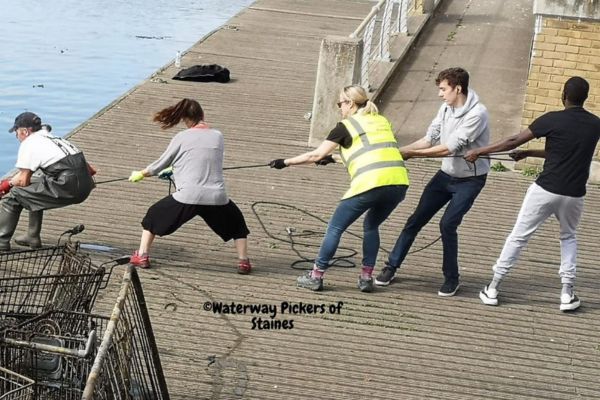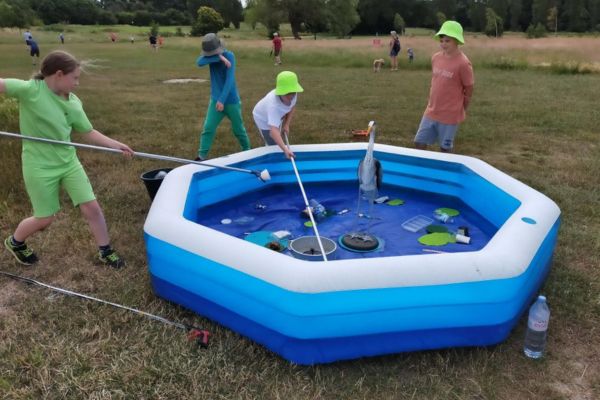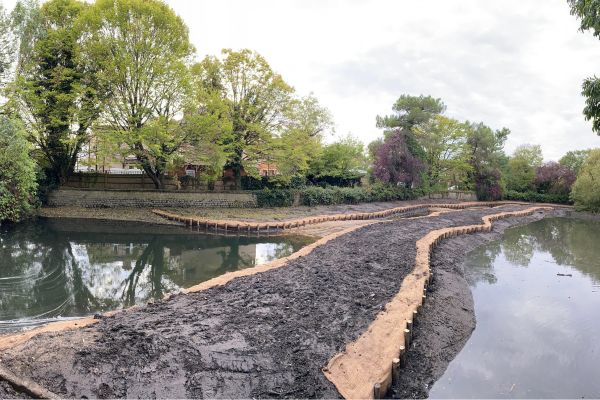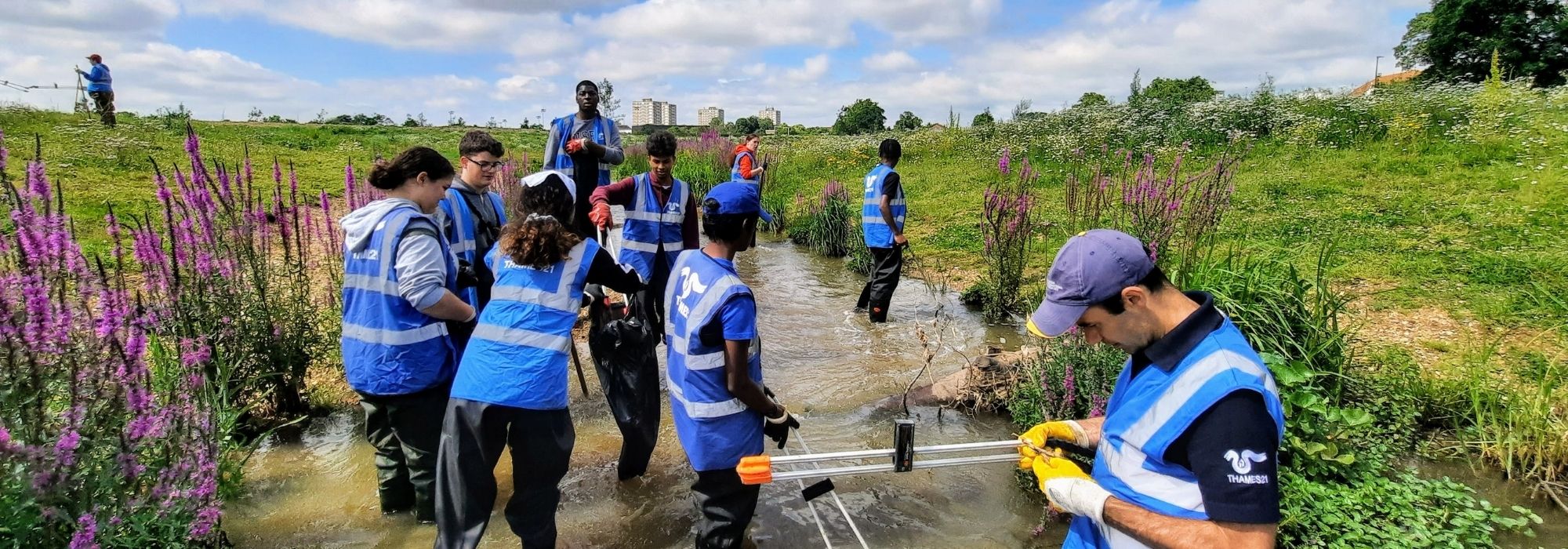2023 round-up: Working together to improve rivers for all
2023 has been a challenging, busy, and extremely rewarding year for Thames21. As we continue our mission to protect and enhance our waterways while connecting these precious blue spaces to local communities, our team has grown, and we’ve achieved milestones and delivered projects across a range of locations from Oxford and London to Essex.
We have many reasons to celebrate and highlights worth mentioning. One of these was the success of this year’s London Rivers Week, the biggest we had so far. The week-long annual campaign took place between May and June, and we held more than 43 events across London, inspiring people to cherish and protect rivers. More than 2,000 people joined us, and we’re hoping to reach an even bigger audience in the 2024 edition, which will happen between the 22nd and 30th of June.
 We also had the Plasticblitz event that attracted more than 550 supporters – the most popular one so far. The annual initiative, now in its third edition, aims to engage community groups and Environment Agency teams to take part in a simultaneous litter pick and data collection activity around their local rivers. This data can be used to educate people, create publicity and lobby for change. We can’t wait for next year’s event!
We also had the Plasticblitz event that attracted more than 550 supporters – the most popular one so far. The annual initiative, now in its third edition, aims to engage community groups and Environment Agency teams to take part in a simultaneous litter pick and data collection activity around their local rivers. This data can be used to educate people, create publicity and lobby for change. We can’t wait for next year’s event!
Going from events to projects, we had significant launches this year. Starting with the Plastics Action Steering Group, a coalition of national, regional, and local organisations and groups working together to develop a practical and effective roadmap to expand grassroots community action and involvement to tackle plastic pollution in our rivers. In collaboration with our partners, as well as with academics and government representatives, we’ll look for solutions to turn the tide in plastic litter.
In relation to tackling plastic litter, we also published the achievements from our Plastic Free Mersey project. This is a a flagship collaborative approach to reduce plastic pollution in the Mersey River catchment in north-western England. More than 6,000 litter items have been collected and identified. A total of 30 members of the community have been trained as citizen scientists. In addition to this, data has collected across 13 rivers and brooks within the Mersey Catchment.
Another exciting project is the EMPOWER Rivers Programme. Thames21 received funding from The Lund Trust to deliver the programme over five years, empowering people to gather evidence and advocate for improvements in their local rivers. The extensive training will provide knowledge and specialist skills which will enable communities to look after, monitor and improve river health and undertake small-scale river restoration activities. Volunteer-led groups will be able to apply for small grants to fund their work.
Biodiversity loss became a key phrase this year – and rightly so. To mitigate this issue, the Environment Act 2021 set out a Biodiversity Net Gain (BNG) framework that requires developers to deliver a BNG of 10%, which means leaving the natural environment in a measurably better state than before. This becomes mandatory in January 2024. Thames21 is developing a network of ‘shovel ready’ restoration projects across London, which will become a River Habitat Bank to help potential buyers meet their unit needs. We hope this initiative will be effective in boosting local biodiversity.
 Moving on to flood resilience, the Catchment to Coast project launch happened in July. In partnership with Defra, the Environment Agency, Southend-on-Sea Borough Council, Thurrock Borough Council and other organisations, the Catchment to Coast project is using innovative nature-based solutions to improve flood and coastal erosion resilience. Some of the solutions are installing leaky dams, rainwater harvesting tools, local monitoring and early warning systems and enhancing saltmarsh establishment and regeneration.
Moving on to flood resilience, the Catchment to Coast project launch happened in July. In partnership with Defra, the Environment Agency, Southend-on-Sea Borough Council, Thurrock Borough Council and other organisations, the Catchment to Coast project is using innovative nature-based solutions to improve flood and coastal erosion resilience. Some of the solutions are installing leaky dams, rainwater harvesting tools, local monitoring and early warning systems and enhancing saltmarsh establishment and regeneration.
From east to west, our Community Action for The Cut in Bracknell is another one of our brand new projects. Working with the local community and partners, we aim to improve river health, enhance its natural flow, and create habitats for wildlife through the installation of wood deflectors and brash berms, and by removing a rock weir. We have just started delivering volunteering events in December.
After years in the making, we worked with our partners to launch the second phase of our road runoff project in October. For the second phase of the initiative, we launched an online, interactive and evidence-based decision tool which highlights where the opportunities are to install nature-based solutions, such as wetlands, to tackle road runoff pollution before it ends up in London’s rivers. It’s a first-of-its-kind initiative that will help decision-makers prioritise areas highly impacted and choose the right water quality improvement interventions. The project was delivered by Thames21 and other partners such as Middlesex University and the South East Rivers Trust.
2023 also saw another edition of the Big Wet Wipe Count. Our volunteers collected thousands of wet wipes amounting to 70 bin bags weighing over 500kgs. Over a period of six years, we have collected more than 135,000. We also welcomed another consultation on plastic in wet wipes launched by the government. We’re waiting for the results and hoping that we’ll see a ban on plastic in wet wipes in 2024. Fingers crossed!
We also successfully submitted applications to Defra to secure bathing water status for Henley and Wallingford. Hopefully these applications that encompass two popular stretches of the River Thames, will be approved at some point next year. We trained local citizen scientists to record the number of bathers at the sites and gather water quality samples throughout the bathing water season. These were important steps in helping us to complete our applications. If successful, the Environment Agency is required to monitor the water quality weekly during the bathing season and publicise the overall results.

We have some exciting updates on some river restoration projects, such as the Chinbrook Meadows and the River Ravensbourne & Glassmill Pond. After years of planning and months of excavation, we started the planting in Chinbrook Meadows. Our brilliant volunteers planted 550 plants in just one day and will continue the work next spring. We have also made great progress separating the Glassmill Pond from the River Ravensbourne, which will help to slow down the rate of siltation on the pond and maintain its depth for longer. We also installed cobbles and gravel on the riverbed to enhance fish passage along the river.
All in all, more than 6,000 volunteers engaged in our activities and helped us to improve our rivers over this year. We have also developed three integrated constructed wetlands and improved 4.5km of river habitat over this year.
Thames21 won the prestigious Ashden Awards together with Enfield Council in the climate innovation category for our joint work creating nature-based solutions to address flood risk and improve water quality across the Enfield area. There was strong competition for the awards and Thames21 and Enfield Council were chosen from more than 200 applicants for the pioneering project. Quite the ending of a great year.
We couldn’t have achieved and progressed so much without our hard-working and dedicated team, volunteers, funders, trustees and partners. Without your time and support, the essential work that we do to build climate resilience across London and the Thames Basin to protect and improve rivers, working with communities, wouldn’t be possible. A heartfelt thank you to each and all of you. Let’s keep up the good work in the new year!
